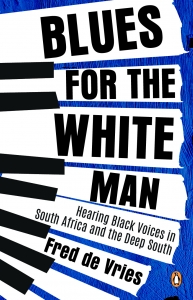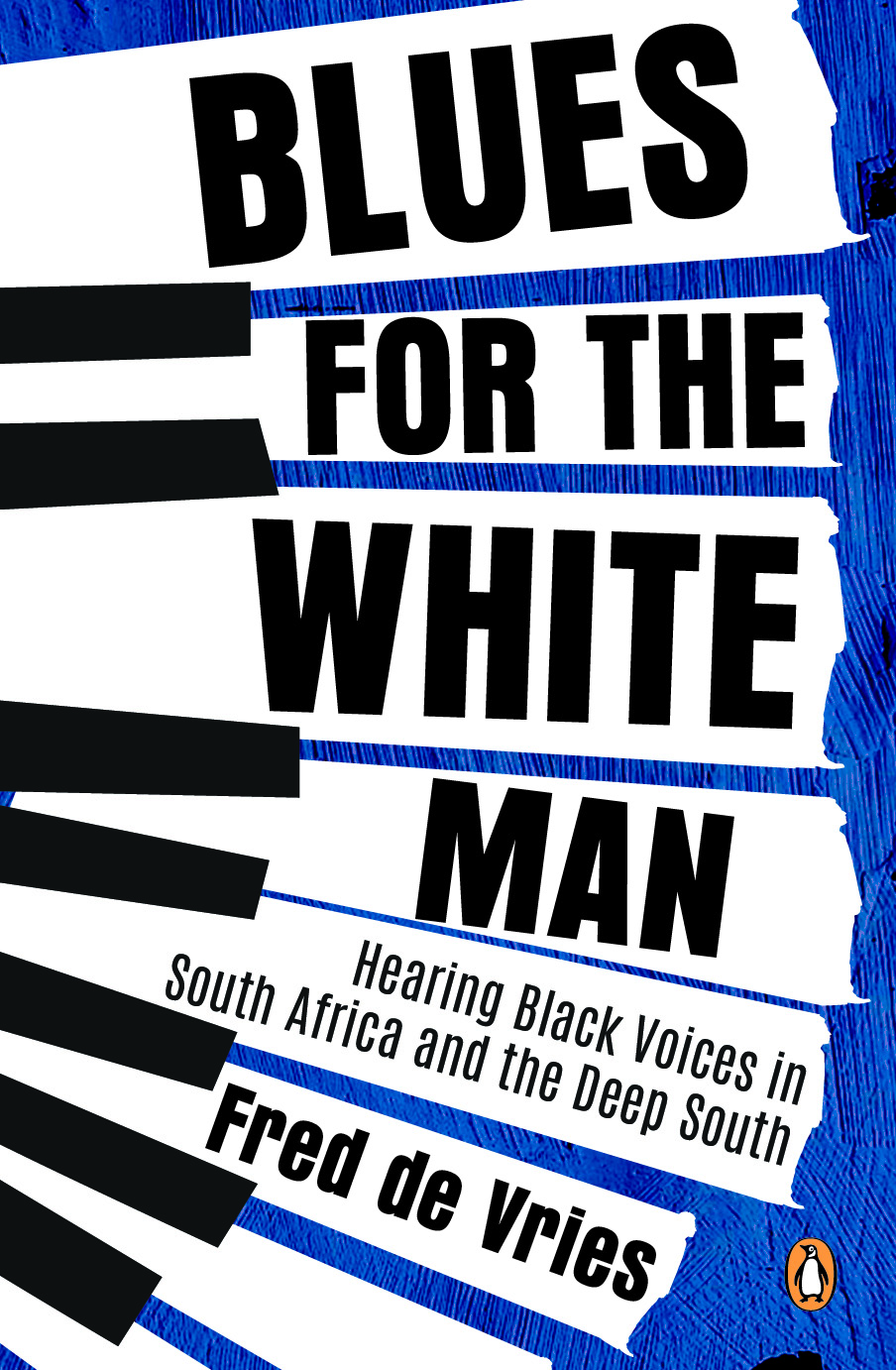
A fascinating, insightful journey through time and space, Blues for the White Man is a celebration of multiculturalism.
“ATTRACTED BY COMPARABLE SENTIMENTS, other black activists from different parts of America had moved to Jackson over the years. In 1990 some of them formed the Malcolm X Grassroots Movement (MXGM) which, just like the RNA, wanted to use the nationalist separatism that Malcolm X had preached in the 1960s as a touchstone.
‘We feel that this country was formed illegally, pretty much as a colonial settler experiment. It was set up brutally, marked by death and genocide,’ says Akil Bakari, one of the founding members of MXGM. He argues that, given this history of exploitation and oppression, the demand for an autonomous state is absolutely legitimate. ‘Malcolm said land is the basis of all independence.’
We’re sitting in his office, a very basic place with a desk, chairs and a computer. I nod and ask him if he is familiar with Orania, that awkward attempt at an Afrikaner enclave in the Northern Cape. He shakes his head. After some prodding from my side, he opens his computer, googles ‘Orania’ and reads an overview of the exclusively Afrikaans, Christian settlement on the banks of the Orange River. Perhaps he’s surprised to see that a conservative bunch of whites in Africa share some basic ideas with a group of socialist blacks in America. He reads attentively and then says that he sees this white homeland in South Africa as completely different from the concept of a black homeland in America. ‘It’s not about lording over other groups,’ he says, but then concedes that ‘the concept of what they are doing is interesting, but some of the reasoning behind it is sketchy’.
We get back to the tactics of black self-determination. My main question is where the land for such an initiative would be and how one would go about obtaining it. Forced occupation isn’t really an option, and waiting for government reparations is akin to waiting for Godot. Bakari nods and tells the story. MXGM and the RNA, he says, decided to start working with the poor and downtrodden in and around Jackson, not just black people, but also Native Americans, Hispanics, illegals and even poor whites. They would gather and organise them in socialist councils and co-ops. They would also educate and train a new generation of activists, to prevent the movement from ageing and fading away.
As is often the case with this kind of project, the practice didn’t keep up with the theory. Jackson and its people had deteriorated too far, and the jargon about socialism, co-ops and people’s councils fell on deaf ears. ‘Our people are suffering. It’s very hard to hear about land and independence when you have to worry if you still have a job tomorrow, enough to eat, pay your rent,’ says Bakari. So, once again, the Kush dream and black autonomy project went back to their place in the cooler. The ambitions were downsized and the tactics changed: they would now focus on self-government in a couple of poor neighbourhoods. Small successes would pave the way for bigger ones and, who knows, eventually the word Kush would be on everyone’s lips.
The problem was that this new vision demanded participation in ‘regular’ politics, dealing with established political parties, even joining them. That was a huge concession. It was the first time the RNA and MXGM stepped into the arena of bourgeois politics, with all its contradictions, limitations and restrictions. It was a hard decision, admits Bakari, ‘but it gives us a larger platform, and the process of getting there also allows us to reach more people who obviously don’t think the way we do, but who do understand who we are. We wanted to show them that we have a plan and an agenda where we try to build collective input and collective governance.’
“The capital of a Southern state would be led by a radical black Northerner, a socialist who had once called a white judge a ‘racist dog’.”
Jackson, in other words, became the focus of an experiment with black governance – all within the law and without the guns. The eloquent and experienced Chokwe Lumumba became the face of this movement. In 2009 he stood as a Democratic candidate for the local elections. Obama had just been inaugurated as the first black American president, and the second era of Reconstruction was about to commence. Lumumba rode the wave and won effortlessly. Three years later, he announced his candidature for the position of mayor. Whites sniggered. A black outsider, a revolutionary and a Northerner, contending for the position of mayor of Jackson? Who does he think he is? But twenty years of hard work and mobilisation at the grassroots level paid off. The apathy in the black population had disappeared. Lumumba received no less than 87 per cent of the vote.
This was a stunning breakthrough: the capital of a Southern state would be led by a radical black Northerner, a socialist who had once called a white judge a ‘racist dog’. A man who stayed true to his militant past, and whose ultimate goal was the creation of a sovereign black republic in the United States of America. It was a revolutionary moment. During his inauguration, Lumumba made it clear that the years might have made him more pragmatic, but certainly not less combative. He stood up and bellowed the rallying cry of the movement: ‘Free the land!’ His followers raised their fists and responded with ‘By any means necessary!’ – their take on a slogan that was popularised by Malcolm X and which doesn’t exclude violence as a useful tactic in the liberation.
The new mayor was eager to demonstrate that he was a diligent, dynamic man. He and his activists would show the world that they were more than ‘that bunch of revolutionaries’ or ‘extreme leftists’, and that real change was on the cards. Their view was that the impoverished black population was not dispensable. In fact, Jackson would be ‘the city of the future’, an egalitarian community governed by black people for black people. At last, after a delay of more than 100 years, the ideas that were first propagated during Reconstruction would become a reality: complete emancipation for the descendants of the slaves. Straight away, big plans were initiated to give Jackson’s badly deteriorating infrastructure a complete overhaul. Tenders would no longer be awarded to outside companies but to local entrepreneurs. That way, the local economy and the local labour market would receive the necessary stimulus. ‘Local’ was the magic word. And local was black.
But the devil still haunted Mississippi. On 25 February 2014, less than eight months after Mayor Chokwe Lumumba had been sworn in, he died following complaints about chest pains. Of course, there was no shortage of conspiracy theories; after all, this was America, a country where black leaders had routinely been eliminated when they became too powerful. Pathologist Michael Baden, famous for his work on the O.J. Simpson case, was flown into Jackson to see if there were any signs of foul play. But he could only conclude that the cause of Lumumba’s death was an aortic aneurysm, probably caused by exhaustion.
New mayoral elections swiftly took place. MXGM urged Lumumba’s son, Antar, to stand as a candidate. Antar had his doubts but eventually relented. His campaign started late and was underwhelming. The conservative black minister and evangelist Tony Yarber won. The white business community, the old boys’ network, breathed a sigh of relief. The fact that Yarber’s faith in prayer sometimes went beyond the absurd (one of his tweets read: ‘Yes … I believe we can pray potholes away. Moses prayed and a sea opened up’) didn’t bother them: the radical black danger was gone, and things would go back to normal. The Old South had been saved once again.”
________________________________________________________________________________________________________________________________
  |
by Fred de Vries
|







